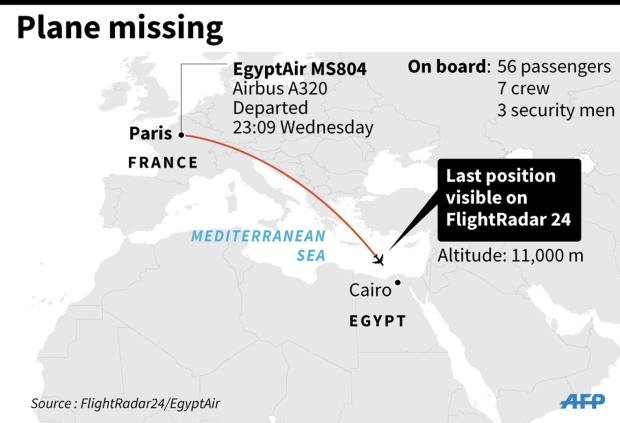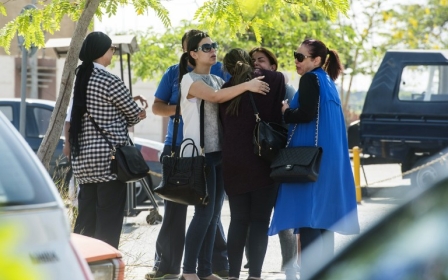Debris, body part and luggage found from EgyptAir flight: Egyptian military

Debris found in the Mediterranean on Friday is believed to be from missing EgyptAir flight MS804, the Egyptian military has said.
The Egyptian military's official spokesman said on Facebook that the debris, which included passengers belongings and parts of the aircraft, was found in an area of the Mediterranean 290km north of Alexandria.
Reuters has reported that the Egyptian Navy are searching for the plane's black box.
Flight MS804 was en route from Paris to Cairo with 66 passengers and crew onboard when it vanished early on Thursday morning.
Egyptian President Abdel Fattah al-Sisi has expressed his condolences to the families of the victims. In a statement released by his office, he said: “The presidency with utmost sadness and regret mourns the victims on board the EgyptAir flight who were killed after the plane crashed in the Mediterranean on its way back to Cairo from Paris.”
On Friday afternoon family members of several of the 66 victims died in the EgyptAir plane crash held prayers for the dead in Cairo's Sultan Hussein mosque. Among the victims of the crash of the EgyptAir flight 804 on Thursday were Salah Abu Laban, his wife Sahar Qouidar, their son Ghassan Abu Laban and daughter-in-law Reem al-Sebaei. Their relative, Abdel-Rahman al-Nasry, told the Associated Press that "this is very hard for the family".
Egypt's aviation minister said on Thursday that while it was too soon to say why the Airbus A320 flying from Paris to Cairo had vanished from radar screens, a "terrorist" attack was a far more likely scenario than a technical failure, an analysis widely backed up by aviation experts.
However, on Friday, France's foreign minister said there was still "absolutely no indication" about what had caused the crash in which all 66 passengers and crew are feared to have been killed.
"We're looking at all possibilities, but none is being favoured over the others because we have absolutely no indication on the causes [of the crash]," Jean-Marc Ayrault told French television.
The French government will meet families of the victims on Saturday in order to "provide all the information we can," Ayrault added.
No group has as yet claimed the bombing, although suspicion has fallen on the Islamic State (IS) group, which has attacked both France and Egypt in the past year. The group took responsibility for the bombing of a Russian passenger jet over the Sinai last year that killed all 224 people on board within 10 hours of the attack.
EgyptAir says that there were 56 passengers on the Cairo-bound flight, including three children, as well as 10 crew members including three security personnel, a setup the airline described as standard practice.
Greek Defence Minister Panos Kammenos said the aircraft swerved sharply twice in Egyptian airspace before plunging 22,000 feet (6,700 metres) and disappearing from radar screens about an hour before it was due to land in Cairo. Mixed reports have emerged about whether the plane sent out a distress signal or not.
A Greek aviation source said the flight had disappeared from Greek radar at around 0029 GMT on Thursday, around 130 miles off the island of Karpathos.Greek civil aviation chief Constantinos Litzerakos said the pilot had mentioned no problem in the last communication before the plane disappeared, and it had not deviated from its course.
"The flight controllers contacted the pilot at a height of 37,000 feet [near Athens]... he did not mention a problem," Litzerakos told Greece's Antenna TV. EgyptAir's Adel also said there had been "no distress call" before the plane vanished.
Neither the Greek coastguard nor the navy could confirm reports that a passing ship had seen "a ball of fire in the sky".
The civil aviation chief said if there had been an explosion, any debris would have been scattered across a wide area.
The head of Greece’s air traffic control board, Serafeim Petrou, told the Guardian that it was certain the plane had crashed, but that it was likely “at the bottom of the sea” which would make recovery operations extremely difficult.
“Nothing can be excluded. An explosion could be a possibility, but then so could damage to the fuselage,” he said.
New MEE newsletter: Jerusalem Dispatch
Sign up to get the latest insights and analysis on Israel-Palestine, alongside Turkey Unpacked and other MEE newsletters
Middle East Eye delivers independent and unrivalled coverage and analysis of the Middle East, North Africa and beyond. To learn more about republishing this content and the associated fees, please fill out this form. More about MEE can be found here.





